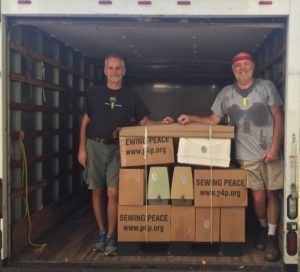 On 12 September 2016 we shipped 34 sewing machines to Cherehani Africa, our new partner in Nairobi, Kenya.
On 12 September 2016 we shipped 34 sewing machines to Cherehani Africa, our new partner in Nairobi, Kenya.
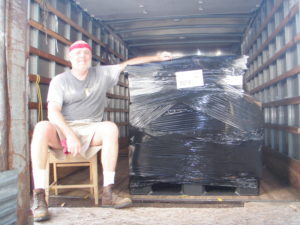 The finished pallet is ready to go to the port for shipping. Estimated arrival in Kenya: 15 November 2016.
The finished pallet is ready to go to the port for shipping. Estimated arrival in Kenya: 15 November 2016.
Yes it was hot!
CNN Heroes is a TV special created by CNN to honor individuals who make extraordinary contributions to humanitarian aid and who make a difference in their communities. Dave Schweidenback, P4P founder and CEO, was a 2008 CNN Hero for his work with P4P. Shin Fujiyama was a 2009 CNN Hero. He founded Students Helping Honduras, an NGO that runs projects in Honduras to support education, housing, and microfinance.
In the summer of 2016, Shin got in touch with Dave and recorded a conversation about P4P history, philosophy, the economics of development and non-profits, the introduction of the wheel, corrupt customs officials, and lots more.
Shin published the conversation in his podcast series. Shin’s website has lots more information about Students Helping Honduras and his other activities.
Click here for an introduction to and a summary of Shin’s conversation with Dave and for links to the podcast audio files.
Every year, Sewing Peace & Pedals for Progress collect hundreds of sewing machines that we ship overseas. Most are in very good working order but there are many that need tuning. Someone who is handy with small gadgets could be of great assistance. If necessary we will train you to make minor repairs of sewing machines. Your help would allow us to reach hundreds more people annually. Please contact Dave at dschweidenback@gmail.com or (908) 638-8893 for more information.
The granddaughter of one of our key volunteers had a bike she had outgrown and she wanted her grandfather to donate it to Pedals for Progress. We wrapped it up with orange tape so we could follow it and then we put it in the front of a container going to Chisnau, Moldova.
We thought we had lost track of this bike as we had not heard back from our partner, but it turned out we just had an email problem, which is now fixed. This is the very happy little girl who received the bicycle from a very generous young American.
by Kwaku Agyemang
Spring 2016 InGear
[In November of 2014, P4P sent an entire 40-foot container of just spare bicycle parts to WEBike, our partner in Ghana, West Africa. These parts, valued at a little over $300,000, were a generous donation to P4P from Bell Sports. Here is a report from Kwaku Agyemang, our partner at WEBike in Ghana.]
When we got the shipment containing the bicycle spare parts, our idea was to use them to repair and service some old unusable bicycles that have been in WEBike’s warehouse for some time now. These bicycles were unusable because some parts were missing or not working when the shipment arrived. Bike parts from some unusable bikes were used to repair other bikes to make them ready for dispatching, but we still had many bikes in no condition to sell or donate.
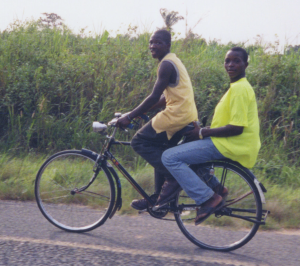
Besides using the new parts to repair the bikes in our warehouse, WEBike decided to try an additional strategy. We wanted to visit some people who already had our bikes to check the condition of their bikes. Maintaining a bike can be very expensive, so it makes sense to help with maintenance as well as with the original acquisition of the bikes.
For instance, in Walewale we visited Mr. Usifu, a student teacher. Though Mr. Usifu’s bicycle was in good shape, all his tires had worn out. We gave Mr. Usifu a set of tires and tubes to get his bike back on the road. This placed a big smile on his face.
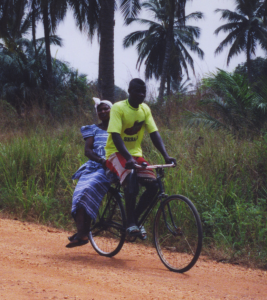 We also visited Paa Joe, an apprentice and inhabitant of Suhum in the Eastern region. We discovered that his bicycle had been unusable for some months. When asked why, Paa Joe lamented that he was the youngest apprentice in the shop where he learns his trade, and that his bicycle had been seriously abused by his master and his senior colleagues. Paa Joe further explained that because the bike was unlocked when he got to work, it was at the service of everyone at the shop and his junior position at the shop prevented him from saying a word. WEBike checked the bike carefully and gave Paa Joe a set of tires, a bell, pedals, a seat, lights and a little cash to help him fix his bike. He was also given a lock to ensure his bike was safe anytime he was at work. He was very grateful and speechless at our kindness.
We also visited Paa Joe, an apprentice and inhabitant of Suhum in the Eastern region. We discovered that his bicycle had been unusable for some months. When asked why, Paa Joe lamented that he was the youngest apprentice in the shop where he learns his trade, and that his bicycle had been seriously abused by his master and his senior colleagues. Paa Joe further explained that because the bike was unlocked when he got to work, it was at the service of everyone at the shop and his junior position at the shop prevented him from saying a word. WEBike checked the bike carefully and gave Paa Joe a set of tires, a bell, pedals, a seat, lights and a little cash to help him fix his bike. He was also given a lock to ensure his bike was safe anytime he was at work. He was very grateful and speechless at our kindness.
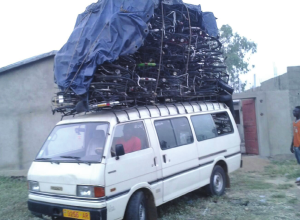 We also visited Esi, a student of Nkwanta Senior High in the Volta Region. We found Esi‘s bike to be functioning very well. When asked how she keeps the bike in such good shape and how she maintained it, Esi replied that the bike was her only means of getting to school on time so she had to save some of her pocket money to maintain the bike. Esi also complained that some of her own friends call her names because she refuses to offer them a ride when they ask. But she was of the view that they lived close to school and could easily get there on foot. She on the other hand had to walk for hours to get to school before the intervention of WEBikes. She further explained how much her education meant to her and that she did not want to jeopardize it. We gave Esi a pair of tires, a seat, a bell, lights and other parts to be used whenever she needs them.
We also visited Esi, a student of Nkwanta Senior High in the Volta Region. We found Esi‘s bike to be functioning very well. When asked how she keeps the bike in such good shape and how she maintained it, Esi replied that the bike was her only means of getting to school on time so she had to save some of her pocket money to maintain the bike. Esi also complained that some of her own friends call her names because she refuses to offer them a ride when they ask. But she was of the view that they lived close to school and could easily get there on foot. She on the other hand had to walk for hours to get to school before the intervention of WEBikes. She further explained how much her education meant to her and that she did not want to jeopardize it. We gave Esi a pair of tires, a seat, a bell, lights and other parts to be used whenever she needs them.
In the towns we visited, we also noticed that some people who had not gotten their bikes from us were having problems with their bikes. We want to help them, too. We met Mr. Cobbla at a bicycle shop where he repairs his bike. After a chat with him we gave him a seat, a bell, and a set of tubes, which he needed to fix his bicycle. We also spotted Mr. Azuri pushing his bike to the workshop. Mr. Azuri told WEBike he had to walk for 30 minutes to the shop to fix his flat tire. We gave him set of tires and tubes to maintain his bike. He was very grateful and pleased with the organization.
by Ened Mato
Spring 2016 InGear
December 2015: 2 babies died from the cold. They belonged to the Roma community, one of the most marginalized communities in Albania. Since 1990 they have been in constant movement.
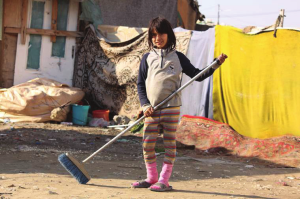
They raise their homes near rivers so they have access to water for drinking and cleaning. Simultaneously they do some of the best work that humans do for their planet, which is recycling. But they suffer, they have always suffered in Albania. They have more than 25 years of living on trash heaps and wandering in the open air.
The Roma people in Albania alone have 500 of their children at risk from the cold, the winter rains, and from poverty. They are full of life. You can find them everywhere, separating trash from recyclables. You can find them in the street begging for money, or in bars selling almonds and walnuts.
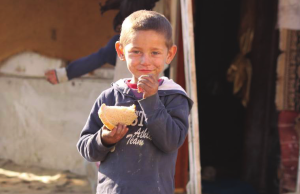
They are everywhere, and often are victims of violence, exploitation, or abuse. You can see these kids everywhere except at school! None of them go to school for a simple reason: they are unwashed and unkempt, and are too embarrassed to attend school, where they feel rejected. Their problem lies precisely in their living conditions. This is the point where all the problems of this community begin. Lacking adequate living conditions, they lack the opportunities that others have. So because of the lack of sanitation in their communities they do not go to school but instead go out on the street. It is a vicious circle from which it is so difficult to disconnect the dots. This is why we hope to attack the problem at its root.
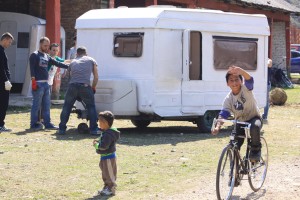
All the money from the sale of the first 100 bicycles from our recent P4P container will go to provide the first house trailers of the First Roma Park in Albania. The trailers will ensure minimal living conditions, adapted also to their nomadic culture. We will supply house trailers to 40 families with 150 children. Pedals for Progress will be the catalyst of this change.
These children will leave the streets and will return to school. They will have the opportunity to be educated and they will have a future. But what is most important is that these Roma will have a roof over their heads for the first time in 25 years. There will be no more babies dying from the cold.
by Patricia Hamill
Fall 2016 InGear
Adaptability, resilience and initiative. These are the key factors that define success in the world of the NGO and that are the very foundation of Pedals for Progress (P4P), a small, but internationally active nonprofit. Founded in 1991 by David this undertaking was not intended to be part of a charity effort, but a leg up for the economically disadvantaged. Over the last 25 years, P4P has searched out communities in the developing world and connected them with access to employment and self-sufficiency by providing them with sewing machines, bicycles and maintenance parts.
To date, more than 145,000 bicycles and 3,200 sewing machines have been shipped to P4P’s nonprofit partners in more than 40 countries including Nicaragua, Guatemala, Ghana, Albania, and Fiji, and the numbers continue to grow as collections are scheduled year round. The partners in these countries arrange the pick up and delivery of the shipments, and they often serve as an ongoing center of support and education for those who purchase the bikes and sewing machines.
It is important to our philosophy of self-empowerment that people maintain a sense of self-reliance and initiative. Recipients of the bicycles and sewing machines that P4P collects and ships are required to purchase them. While the amount may be minimal, we feel that paying for affordable and low-maintenance access to employment offers a long-term solution to poverty. The recipients can earn their own way and take pride in their improved lifestyles. But what are the challenges of such an undertaking? When dealing with the bicycles, there are large containers to ship, customs to navigate, delivery to arrange at the recipients’ location and reliable partners to connect with so that this endeavor remains untouched by mismanagement. These obstacles are among the reasons why P4P is now expanding its focus and putting sewing machines at the front of the list of shipping priorities.
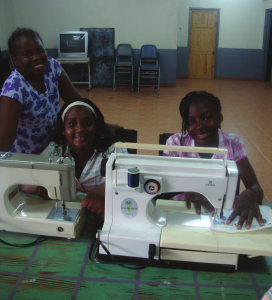 Our sewing machine collections are under the auspices of Sewing Peace—still a part of P4P, but independent all the same. The shipping itself is less expensive and that enables Sewing Peace to allocate more funds towards outreach: We can stack the sewing machines on pallets and transport them in smaller vehicles once at their destination. Usually 20 or 30 machines are enough to fully supply a co-op or school without our needing to resupply. Sewing machines are practical because they are also technologically appropriate to the locations where they are distributed.
Our sewing machine collections are under the auspices of Sewing Peace—still a part of P4P, but independent all the same. The shipping itself is less expensive and that enables Sewing Peace to allocate more funds towards outreach: We can stack the sewing machines on pallets and transport them in smaller vehicles once at their destination. Usually 20 or 30 machines are enough to fully supply a co-op or school without our needing to resupply. Sewing machines are practical because they are also technologically appropriate to the locations where they are distributed.
There are several success stories from long-term and new partnerships formed over the years. One such fortuitous relationship is with the Foundation for the Environment and Sustainable Development (FIDESMA). Located in Guatemala, this organization runs economic development programs that enable locals to learn a variety of skills such as computer use and more efficient methods of agriculture. FIDESMA is able to make use of the bicycles and sewing machines in two ways. First, those who purchase these enhance their earning power by accessing employment in more remote areas or by setting up their own sewing businesses right in their own homes. Then the income from the sales enables FIDESMA to continue to fund its programs and keep the classes running. This system of reciprocity is much more desirable than the cycle of poverty that exists so pervasively in this region.
The Barrouallie Secondary School on the island of St. Vincent is the fortunate institution that welcomed a dedicated Peace Corps Volunteer who was familiar with P4P’s work. She arranged for 20 sewing machines to add to the school’s vocational curriculum. These particular machines are strictly for educational purposes rather than commercial, but the skills these Vincentian students take away with them will help them avoid work in banana production and the insecurity that comes with crop diseases and other negative effects on prices. Tourism is a growing industry on the island, but there are only so many jobs to go around. The sewing machines do not rely on seasons or market values to function reliably.
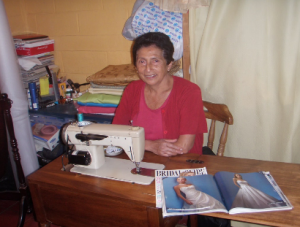 As bicycle donations dwindle in the face of a reduction in consumer spending and an increase in their value as scrap metal, it has become immensely important that P4P maintain its momentum and continue its mission uninterrupted. What Sewing Peace hopes to accomplish, in the spirit of P4P, is to connect with many more people who can provide and store unwanted sewing machines domestically and may have ideas and suggestions as to where Sewing Peace can expand their footprint in the world.
As bicycle donations dwindle in the face of a reduction in consumer spending and an increase in their value as scrap metal, it has become immensely important that P4P maintain its momentum and continue its mission uninterrupted. What Sewing Peace hopes to accomplish, in the spirit of P4P, is to connect with many more people who can provide and store unwanted sewing machines domestically and may have ideas and suggestions as to where Sewing Peace can expand their footprint in the world.
Making changes after 25 successful years can be difficult for some, but P4P was founded on challenge and filling a need. Pedals for Progress and Sewing Peace embrace the evolution that must happen to keep the spirit of economic stability alive. The needs of the poor stay the same but how they are met must evolve and this NGO is not losing any momentum shifting gears and running smoothly ahead. As the saying goes, “A rising tide lifts all boats.”
[Patricia Hamill, M.A., is the founder of Heron Moon Press and an adjunct faculty member at Pace University and Southern New Hampshire University specializing in Composition Studies. She is a freelance writer and editor who regularly contributes to “InGear,” the newsletter of Pedals for Progress. Her blog on writing and mindful living can be found at HeronMoon.com.]
by Patricia Hamill
Spring 2016 InGear
When requests for donations are made, it’s often assumed that any item, no matter how worn or outdated, is better than none at all. That is correct—for the most part—because old and unwanted cycles definitely can be resurrected, recycled, and repurposed. We have taken even the most well traveled bikes and turned them into viable and reliable transportation for many new owners. But here is the catch: What if the recipients have special requirements or requests? Is it enough to send what happens to be donated at a particular time and let those at the receiving end figure out how to manage from there?
The bikes we send are in good shape and ready to be purchased, so it’s not like anyone has to repair anything before they get rolling. So maybe that is good enough. But who is to say what enough is? There is a story that Gloria Steinem tells about a turtle she found near a road. She was sure the turtle was in danger and in need of help. She made a point of returning it to the river it “belonged” in only to find out later that she had interfered with the turtle’s arduous efforts to travel to her nesting spot. Steinem took that lesson of assumption to heart and began to apply it to all she does when she helps others. Basically she admonishes us all to “Always ask the turtle.” So, we at P4P find ourselves in a similar situation except the turtle has come to us. In other words, we have found out that the concept of what is good enough is relative and our assistance is needed not just for access to jobs but to athletic ambitions that can offer opportunities for life improvement. There are recipients that know better than us what they need and we should pay attention to that.
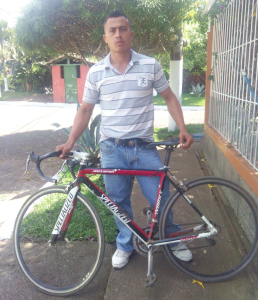 In 2014, we introduced a young man named Juan Carlos Jimenez based in Rivas, Nicaragua. The article, “For the Love of Bicycles” shares Juan’s ambitions to become a competitive bicycle racer. It was the donation of a carbon fiber Motobecane bicycle that made this possible. In fact, his daily employment was in a bicycle shop, so his financial and professional aspirations were both enhanced by his association with P4P. Today we reflect on Sergio Ramos Antonio Quintero, a 25-year-old living in the Nicaraguan municipality of Diriamba. A textile worker by trade, his great interest is in racing bikes and he hopes to do this full time; but he lacks access to the kinds of cycles that can propel his goals into reality.
In 2014, we introduced a young man named Juan Carlos Jimenez based in Rivas, Nicaragua. The article, “For the Love of Bicycles” shares Juan’s ambitions to become a competitive bicycle racer. It was the donation of a carbon fiber Motobecane bicycle that made this possible. In fact, his daily employment was in a bicycle shop, so his financial and professional aspirations were both enhanced by his association with P4P. Today we reflect on Sergio Ramos Antonio Quintero, a 25-year-old living in the Nicaraguan municipality of Diriamba. A textile worker by trade, his great interest is in racing bikes and he hopes to do this full time; but he lacks access to the kinds of cycles that can propel his goals into reality.
So far, he has participated in a number of long-distance races in Nicaragua, winning many second places and bronze medals. His ambition is to be able to have more time to hone his skills; but this means less time at the textile plant and less income. If he becomes good enough to participate consistently and, of course, win, he could merit financial backing from local sponsors. If Sergio leaves the textile mill, his spot will go to another who is in need of work. It’s a winning situation for more than one person.
So, returning to the example of the turtle, we all probably should work on shifting our perceptions about who is in need and what our contributions can really do. It’s not just one bike, one person. It’s about the person as well and what he or she really needs. Their locations, their terrain, their employment or lack of, and their personal ambitions and desires are all part of one large equation that we may not be able to know, but we can offer the widest range of options for them to make use of. If our recipients can thrive better with high-end competition bikes, then let’s make it happen! The good old cruisers have their place and it’s a given that children’s bikes are valued, but if you aren’t spinning past the finish line these days, there is someone out there who is working hard to earn that honor!
Let’s ask our activist and philanthropist selves not just who we can donate to but what they best need. If you don’t know the answer, ask this turtle: P4P.